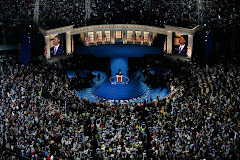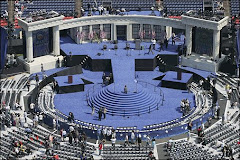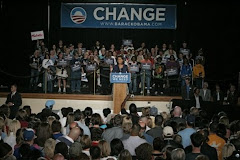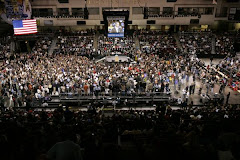Remember your angst when you were in a boring high school history class of your high school days? I bet you exclaimed often why is this important? Why do I have to know such things as the "Missouri Compromise" or "popular sovereignty" things that happened way back in the middle of the 1800's? How is that relevant to me in this post "Orwellian 1984 age of New-speak", to know who the hell was Stephen A Douglas?
In my youthful time, a passing grade in American History was one of the requirements to receive high school diploma by the State of Illinois' Board of Education. These requirements are still in place today. Ironically, I have little sympathy for that kind of ignorance-causing thinking. In fact loved my American History classes. Back in the 1970's, I was, what has become known as a political junkie, mesmerized then by the live daily broadcasts of the "Watergate Hearings". Then as now, I often heard non-critical thinking persons smartly state: "history repeats itself". Well, not exactly, but George Bernard Shaw was probably more precise: "We learn from history that we learn nothing from history."
This week the Presidential Election narrative is again back between the values of "experience" and "judgment". What is so troubling now is how the Clinton campaign is framing her "experience" narrative and thus showing me how little she, her campaign, the media/press and even much of the electorate, has actually "learned from history"--almost nothing! In essence, Hillary Clinton's entire campaign is made up of the "well-crafted illusion" of her apparent experience in a public life. But I am also struck on not knowing or worse outright denying the enormous significance of Obama's 2002 speech. Her belittling this speech the other day framing her composite experience against the sarcastic ploy of saying and all he has got is a speech seals it----she don't know squat!
First thing, before I go and carve up Clinton's supposed experience, let me talk about the importance of one political speech. It was over a hundred-and-fifty years ago, (actually to be precise October 16, 1854 ), when a little-known, obscure, self-taught lawyer, from Illinois named Abraham Lincoln, who was once elected an U.S. Congressman and earlier an one-term State Representative, gave what was then considered a nationally important speech. Delivered in Peoria Illinois, in of all places. Then, the 45-year old struggling lawyer/political organizer in the newly formed Republican Party was railing against the upcoming Kansas-Nebraska Act that was being proposed by the then, Democratic Senator Stephan A. Douglas, also of Illinois. Douglas, at the time, was exceedingly rich and powerful. He having made a fortune from in real estate speculation and railroad interests stemming from Chicago's rapid growth that he fostered personally and politically and also considered one of the most powerful politicians in Washington DC. Lincoln's speech was transcribed and presented to the nation as the quintessential moral, legal and economic argument by the Republican Party movement against slavery, immediately setting the stage for Lincoln’s new-found political future, as one of the rising Republicans political movement that was beginning to dominate the North.
Four years later, (1858), Douglas and Lincoln went head-to-head in Douglas' senatorial re-election bid. They engaged in a series of seven debates that criss-crossed across Illinois. The importance of these debates went far beyond expressing the discourse of time in America, issues that transcended outside of Illinois, because these two candidates were already being considered as contenders for the upcoming 1860 presidential campaign.
The debates also set a precedent in modern-day journalism, where reporters accompanied the candidates on their daily campaigning. Also major newspapers hired stenographers to document their respective speeches, even printing their entire debates for a national audience. Forgotten by most, Lincoln actually won the popular vote in this Senate contest, but the Illinois' State Legislature, through a Democratic Party and Whig Party majority, re-elected Stephen Douglas. (It was not until the Constitutional Amendment in 1913 that U. S. Senators were elected through a popular vote.)
So what! What is the relevance of this brief history diatribe!
Well let us go examine what actually happened and see what if you see any similarities with today? In 1860, Abraham Lincoln, the 51-year old self-taught prairie lawyer, the one-term Congressman some 11 years earlier, a former one-term State Legislator which he served in his late-twenties, was elected as America's 16th President. Let us not forget he was also the elected Captain of the State Militia when it tracked down the Chief Black Hawk of the rebellious Illini in the mid 1830's. Not at all a Presidential resume even back then! Yet he was considered then and now, as one of our greatest presidents ever, first beating his own state political rival Stephan A. Douglas in an election upset (along with 3rd Party candidate Stephen Bell who represented the South). And two, leading a divided nation in the bloodiest war of its history, while keeping a fractured Union together. He also gave the war moral meaning by freeing the slaves.
What really was Lincoln's experience? A speech? Seven Debates? Or the political judgment and moral clarity that was far and away better than any of his experienced opponents. Ironically, his views on slavery were seen as more moderate than even his own party rivals. Further, research into the 1860 election illustrates that Lincoln's had an important element, "western origins". This appealed greatly to the many newer state's electorate, where Douglas, who had far more governmental experience, also acquired many enemies both within his own party and those on the outside. This ultimately made him weak in those critical new states. This was the deciding factor in the Presidential Election where Lincoln swept the New West and broke Douglas in the East, winning enough to offset Douglas's split in the South with Bell. The final analysis also revealed that the majority of new Republicans agreed with Lincoln, that the North, was the "aggrieved party" with the Slave-state economy, as the Slave-States power had tightened their grasp on the national government.
Does any of this sound eerily familiar? All he's got is a speech! Opposed by a powerful and rich political insider family, at a critical, even defining moment in our nation's history, where this political insider family has discounted most of America outside the important "big states", even their own party's health and well-being. They represent the big corporate interests from a long well-healed history of political experience being on the inside where also they are bringing out a long even unseemly history of political baggage and animosity. Is this Stephen A Douglas or the Clintons'? Does it ring familiar that the Big Slave-holding interests are not much different than those of the big corporate interests of the 21st Century aggrieving the regular Americans with its interest in financial economics, trade, health, energy and even war?
This is why I am thinking that most of Clinton's camp, its supporters and even herself have not learned from history and worse emotionally denying its lessons. Lincoln, like Washington before him and Franklin Roosevelt after him, was a gift to America, as Obama is now. At a time when the nation needs it most, a time of true crisis. Lincoln was also not overly partisan, as is Obama, who not running as a Black-candidate, Lincoln did not run as the abolitionist either. Unlike Hillary whose campaign is running as the "woman's" candidate, and not the candidate for everyone. Obama also represents a political movement, like Lincoln before him, where Lincoln had his new Republicans in the North and and new West. Obama on the other hand has the new youth vote, along with the independents, formerly disenfranchised voters, and even many disgruntled Democrats and Republicans. Obama also possesses the moral standing that he and he alone stood up in 2002 and opposed the upcoming war in Iraq, like Lincoln did against the Kansas-Nebraska Act that ushered in the regional civil war known as Bloody Kansas. Yes, Hillary Clinton, both Lincoln's Peoria and Obama's 2002 Springfield were merely speeches that changed the world. What is actually in your resume that changed the world?
Let me see, there also a speech in China that they are pointing to as experience of crisis and management, really? How much personal courage was the exclaiming of woman's rights are human rights in China, while you represented the US with the entire force of the American government behind you? How about being part of a married couple that occupied the White House and your ceremonial duties as First Lady, is that really experience or is that something else? She points to her experience with the Irish Civil Strife, but in actuality you didn't negotiate anything, you merely met those indigenous brave mothers who actually made the peace and won the Nobel Peace Prize. How opportune! Yes you were elected to the Senate in 2000, and then re-elected in 2006, both cakewalks set up by your own party and the Republican's ineffectiveness. Your experience is actually thinner than Obama's, both in time and legislative record, but who is actually accounting, you and your surrogates are merely accusing someone else and avoiding your own history. And then again there is that vote to approve the War in Iraq, yes the biggest single decision of this era. Lest we forget there were 23 Senators and 133 Congresspersons who voted against the measure.
And that is the history lesson of today. The importance of a speech can be more important than the composite and even overblown exclaims of a politician's personal experience. For the speech one like Lincoln's and now Obama's, actually takes personal courage, clarity and judgment, not the calculating insight of a political resume.








No comments:
Post a Comment